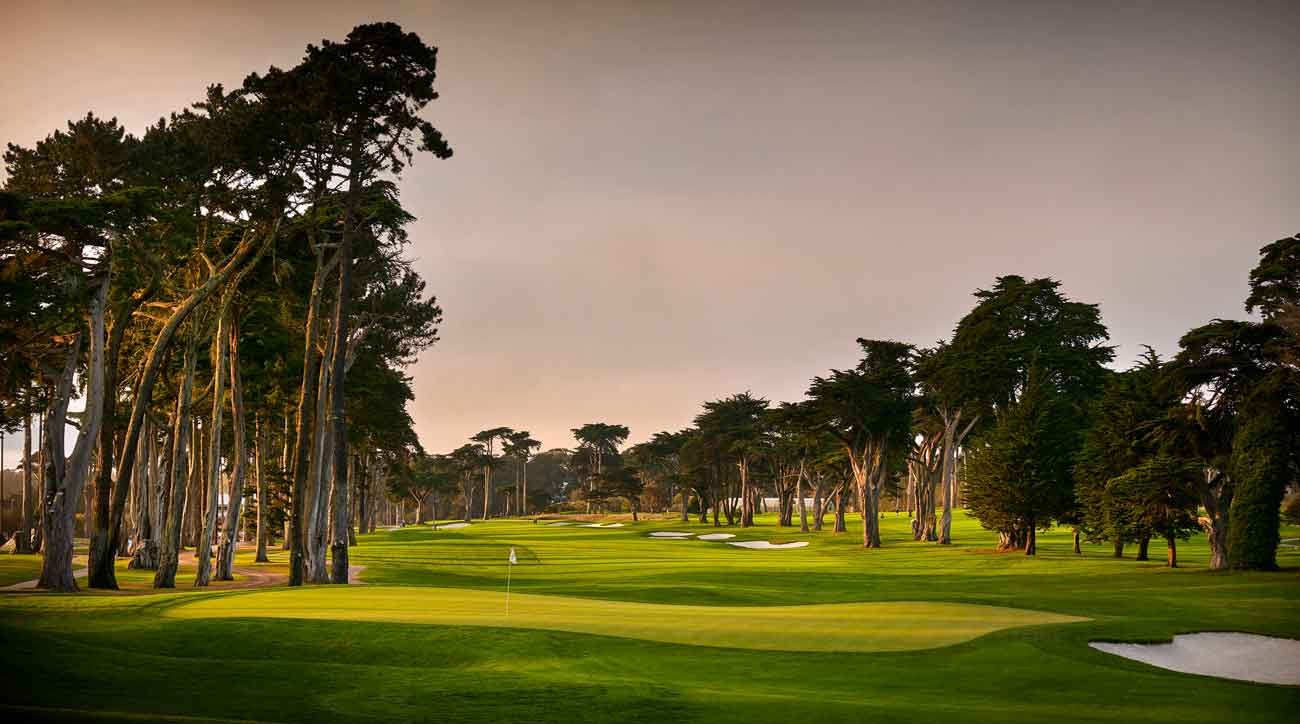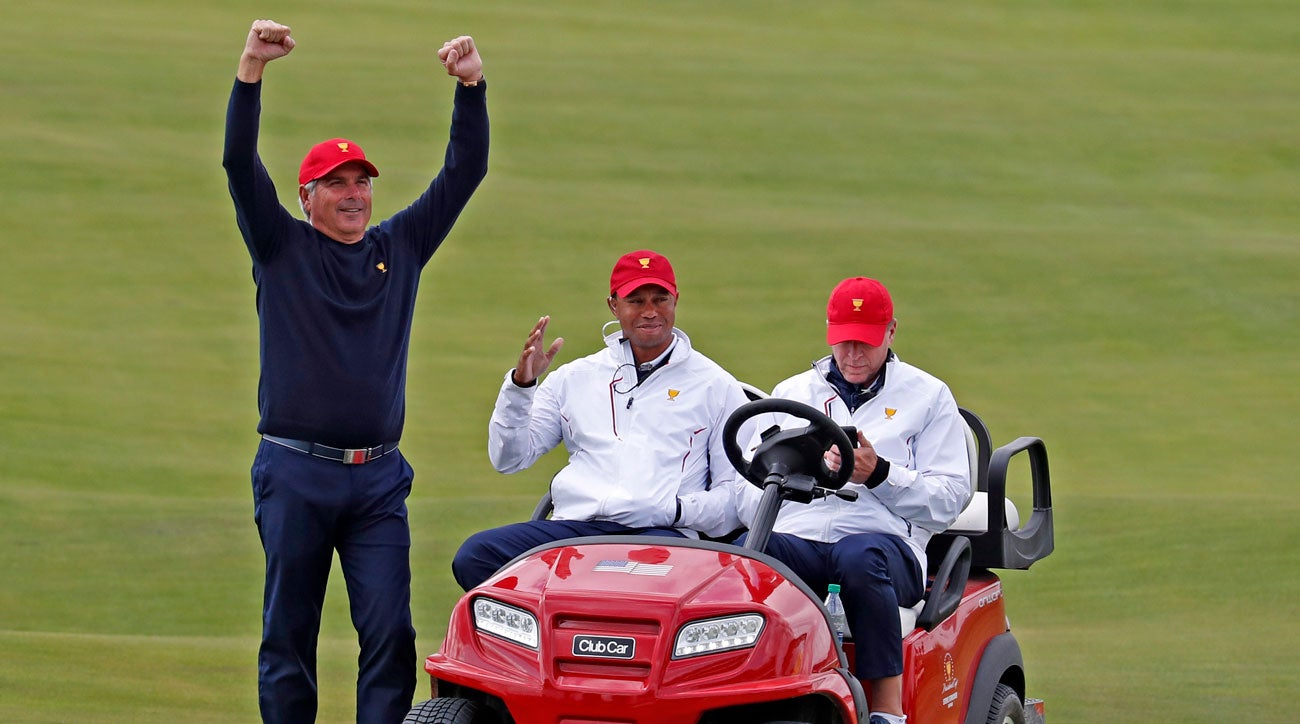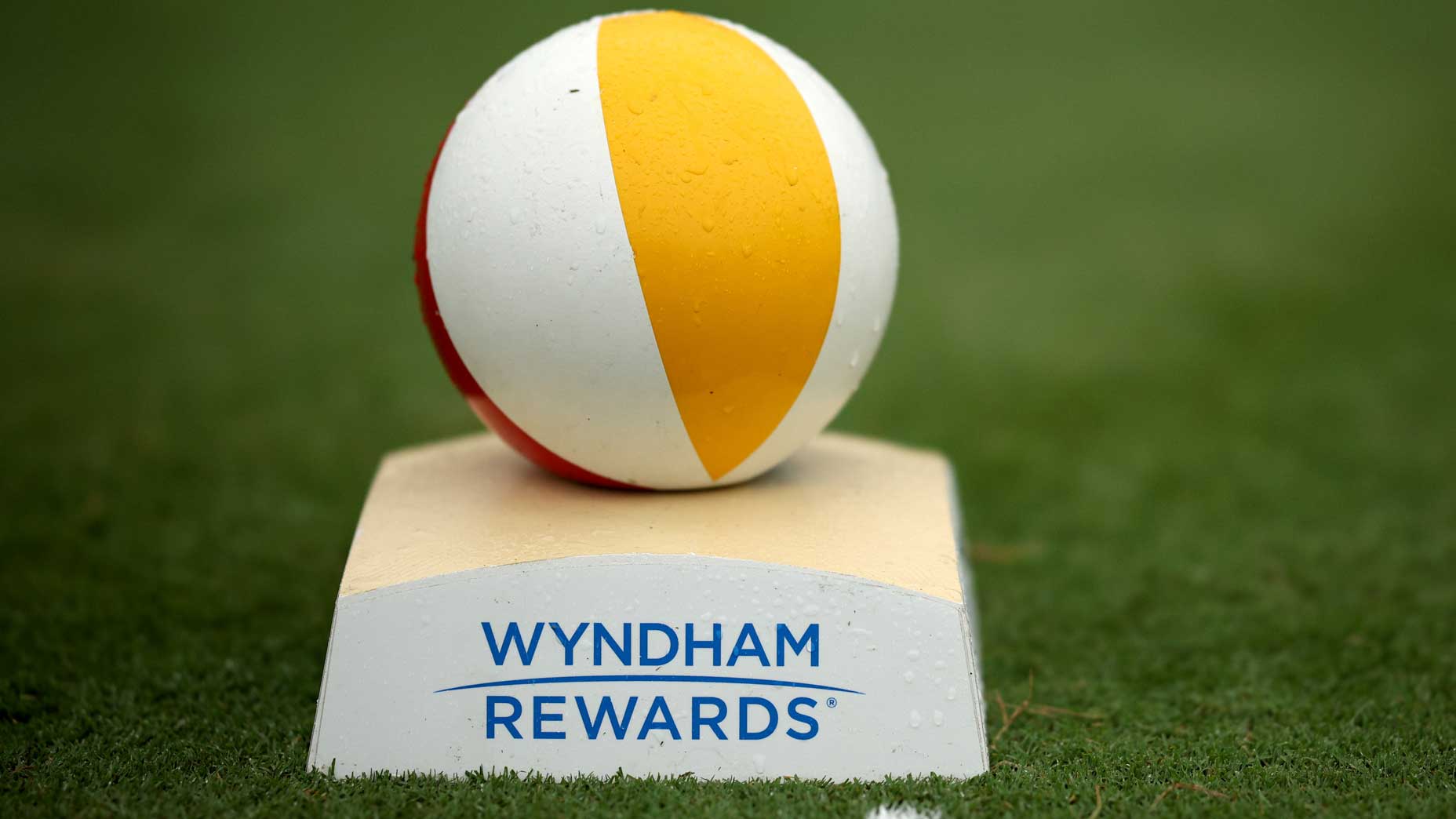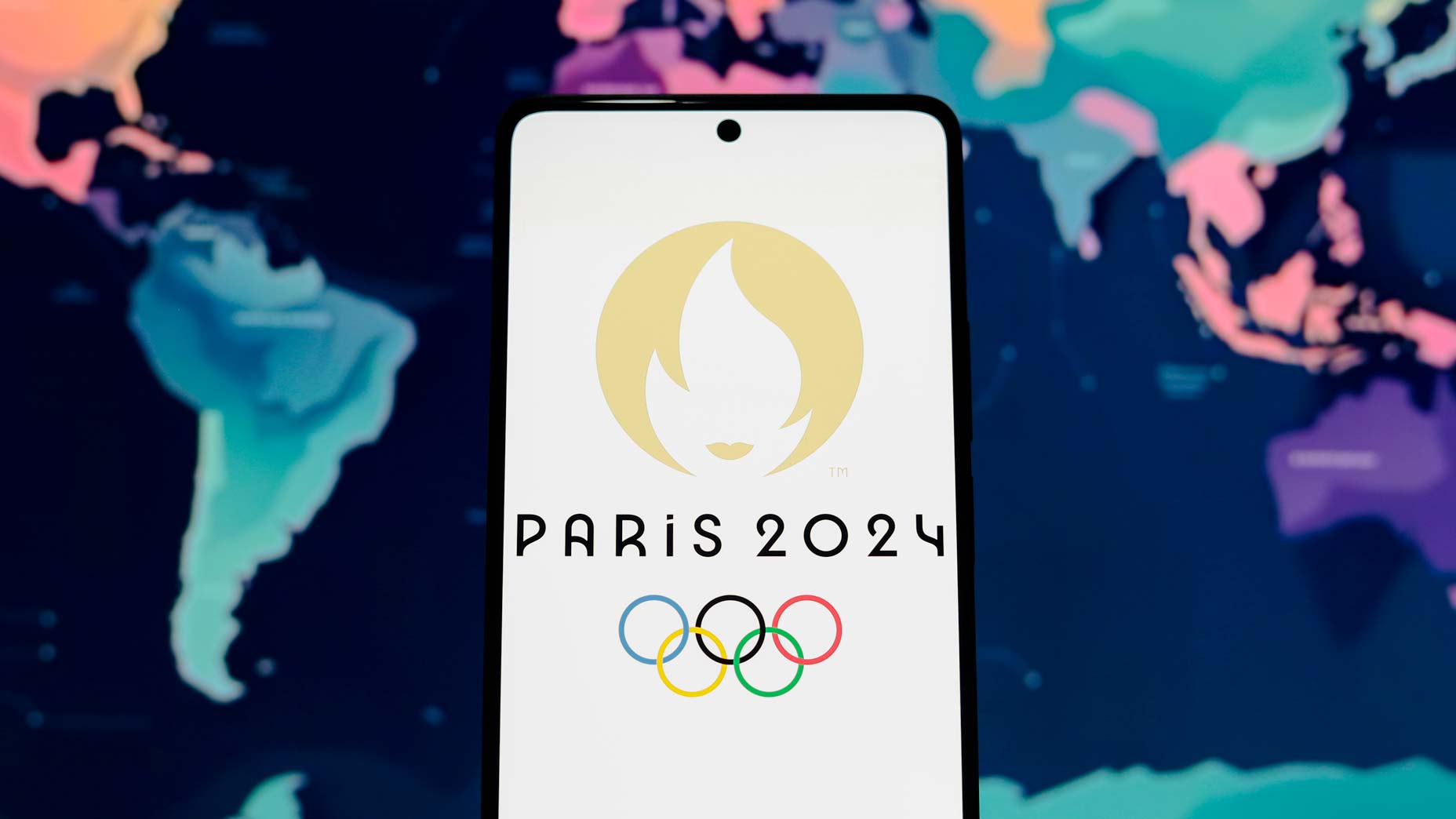 2025 CJ Cup Byron Nelson payout: Purse info, winner’s share
2025 CJ Cup Byron Nelson payout: Purse info, winner’s share
10 surprising things Tiger Woods told Jim Nantz while rewatching Masters win

If Jim Nantz and Tiger Woods can’t get a rock-solid video connection, there seems little hope for the rest of us. Still, there was something comforting about watching Sunday’s re-air of the buttoned-up Masters broadcast as two of golf’s most buttoned-up figures battled lag-time issues and overexposure. Sign of the times and all that.
One important difference between CBS on Sunday afternoon and your evening family Zoom call is, of course, that your uncle likely didn’t win — or lead the broadcast for — last year’s Masters. So Nantz and Woods were uniquely positioned to usher us through one of the greatest golf tournaments of all time.
In truth, the dynamic duo didn’t get off to a particularly dynamic beginning. The divide between Nantz’s home on 17 Mile Drive to Woods’ on Jupiter Island felt tangible. But we learned plenty from watching Woods watch the Masters, and he saved his best for an emotional finishing segment. Here were 10 things the defending Masters champ taught us on rewatch.
1. He would have been ready for this year’s Masters.
This is a tough one to prove, obviously, but one of the first things Nantz asked Woods is whether his body would have been prepared for an April title defense this year after surprising skips at Bay Hill and the Players. Woods left little doubt: “I would have been good to go.”
It was clear from Woods’ short-sleeved appearance in the video chat that he’s been able to spend some time in the gym, so we’ll take him at his word.
2. The Masters Sunday schedule change (mostly) helped him.
Last year, tournament officials made the unprecedented decision to send players off in threesomes off split tees on Sunday morning for the final round of the Masters. Woods, who played in the final group with Francesco Molinari and Tony Finau as a result, said that he mostly benefitted from the change.
“It allowed me to see the leaders, especially Fran, and allowed me to be a part of it,” he said.
Still, he maintained that the morning start was disadvantageous in other ways.
“It was easier, I think, for the guys who had never been there before, who didn’t have to sleep on the lead for as long,” he said. Plenty of 54-hole leaders have spoken of long, nervy mornings at Augusta awaiting a 2:40 p.m. tee time, so this makes sense. Woods also reminded us that it’s always difficult for him to get ready physically for a morning tee time. Not difficult enough, I guess.
3. He thinks Francesco Molinari made solid contact on 12.
What Woods does, over and over, is take in an incredible number of variables and use those to spit out a simple plan of attack. On the broadcast, he described watching Brooks Koepka dunk his tee shot on 12, knowing “he has a more penetrating ball flight than I do.” The wind, Woods said, basically stopped Koepka’s ball mid-flight and deposited it into the water.
Then he describes watching Molinari pull 8-iron — one club more than Koepka — but not hit it hard enough. “He had to take something off an 8,” Woods said. “It wasn’t a mishit, I think he probably just didn’t hit it as hard as he needed to.”
As a result, Woods changed his game plan ever so slightly. “I got a little bit more committed to hit the ball further left,” he said. “I went with more of a straighter ball flight to make sure I got it there, and if anything get it to the back edge of the green.”
Woods said that when he feels like he needs to make something happen, he’ll try to get a look at birdie by playing over the right edge of the bunker. When he likes his position, he aims over the “left tongue” of the bunker on 12. He may have hit it a few feet to the left of his target, but it was basically according to plan and settled safely in the left-center of the green.
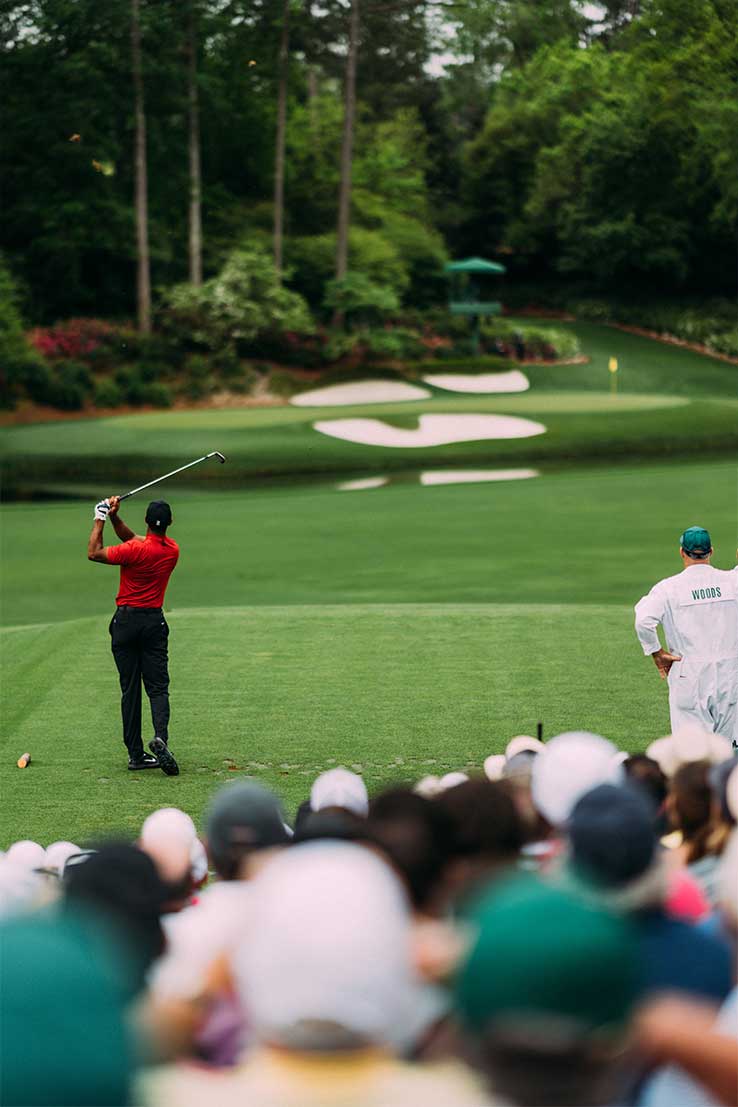
4. He went 20 years without a hole-in-one.
We’d heard versions of this story before, but it was still a shocker to hear Woods articulate it. During the prime of his golf career, when he was playing the best stretch of golf in the game’s history, he made zero aces. Not a single one between 1999 and 2019.
He broke the streak, he said, playing in Palm Springs last year with Rob McNamara, Fred Couples and his son Charlie. It’s hard to say which is more shocking: the fact that he’d had a 20-year drought, or the fact that before then he’d had…19. That’s right, 19 holes-in-one in his first 25 years of life, followed by zero for the next two decades. Tough to wrap your head around.
5. He thinks Finau will be a good fit at Augusta for years to come.
This was interesting: even though Tony Finau couldn’t rise to the occasion from the final group, Woods expects to see him on every Masters leaderboard we’ll see in the coming years.
“Being able to hit a high draw there is such a huge advantage,” Woods said, praising Finau’s ability to work the ball. “That was one of the reasons I sacrificed hitting my cut shorter was to hit that draw a little farther, and it ended up working out.” I’ll say it did.
6. He was nervous on one putt in particular.
After his near-ace at 16 prompted the previous line of questioning, Woods faced a two-and-a-half footer for birdie on 16, and admitted he didn’t love the putt.
“I was a bit nervous about this putt,” Woods admitted to Nantz as CBS showed him surveying the shortie. Even though he said he knew it was “left-center, all day long,” he called in caddie Joe LaCava to consult on the read. “He looked at me like, ‘What the hell are you doing?’
“I stepped away, made sure I got a lot of right hand in that putt.” That was a point Woods kept emphasizing — how important his right hand is to releasing the putter and completing his stroke.
ADVERTISEMENT
7. Woods and LaCava were monitoring the leaderboards.
Sidenote: This is where is really started to get good.
With the tournament on the line, some golfers like to know where they stand. Others would rather keep their head down and control the controllables. Woods likes to know exactly where he is with respect to every other player on the leaderboard. During the final nine of the 2019 Masters, that was nearly impossible. At one point, five players were tied at 12 under. Through it all, Woods said he and LaCava kept monitoring the action.
“Joey was just locked in. He was reading the boards as fast as he possibly could,” Woods said. LaCava knew from the leaderboards and the roars and the lines of sight exactly where each contender stood — and he knew exactly what Woods’ birdies at 13, 15 and 16 meant. All that so he could help reset his player before each shot.
“Our minds are spinning. Meanwhile, you have 157, it’s a soft 9-iron,” Woods said.
He spoke effusively of LaCava’s loyalty in his down years, too, and how much it meant to win “with one of my best friends, a guy who’s been a rock in my life.” He recalled LaCava coming to visit him in Florida, helping drive him to soccer games when he could barely walk, keeping him company. As for what he told him on 18?
“I said, ‘We did it! We did it together.”
8. It meant a lot to have a lineup of players greeting him by the clubhouse.
As he rewatched his celebration, Woods ticked off a list of players who greeted him by the clubhouse. Justin Thomas. Rickie Fowler. Xander Schauffele. Brooks Koepka. Then former Masters champs: Bubba Watson. Trevor Immelman. Bernhard Langer. He made it clear that it was important to him that each group had shown up.
“There’s a different level of admiration and respect from your peers,” he said. “And the majority of the guys I just mentioned had seen me when things weren’t very good.”
Woods has talked before about how special it is to be a part of Masters Champions Dinners the Tuesday night of the tournament. It is, in his mind, the most difficult club to join. To gain readmission must have felt pretty sweet.
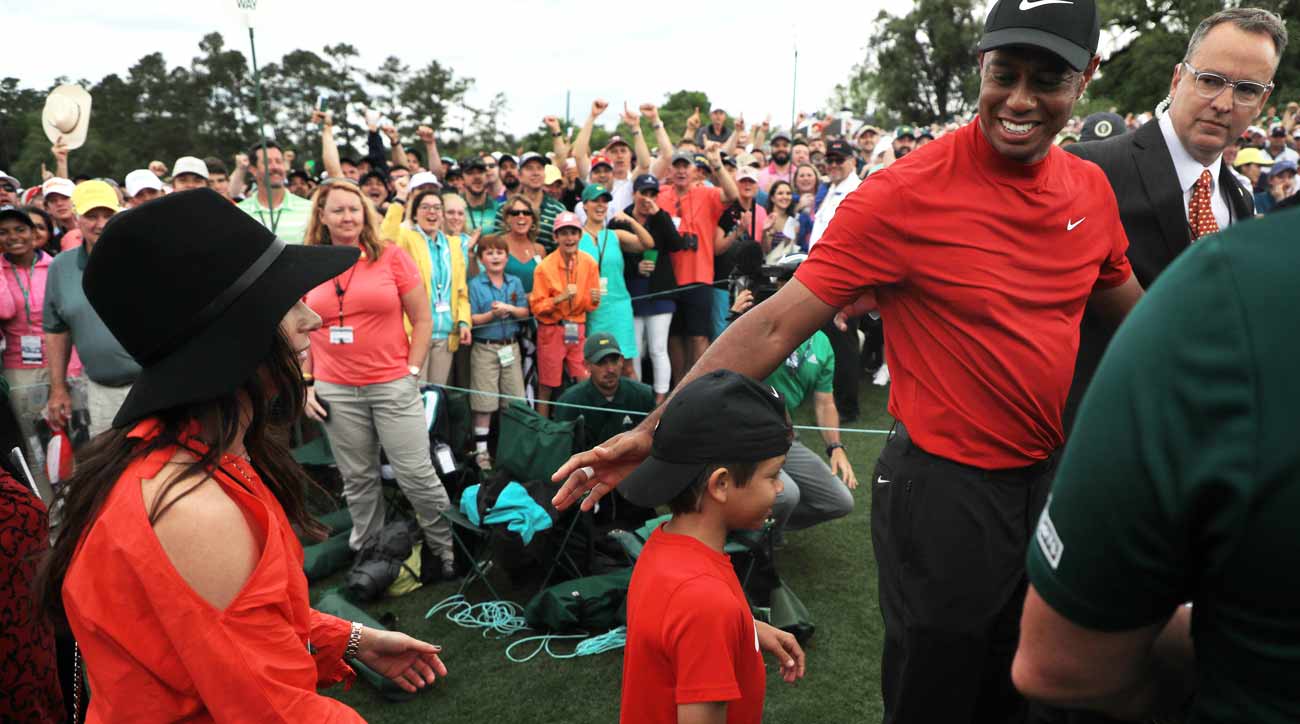
9. Seeing his family behind the 18th green was “surreal.”
For these final two, I’m going to let Woods speak for himself. He doesn’t need any help! On that celebration with his family:
“That’s when my emotion just came flooding out. Charlie was squeezing me, was just getting tighter and tighter. Then I looked at him, squeezed him again.
“Then my mom’s there, she was patting me on my back, saying she was so proud of me, my dad would be so proud if he were here. She said, ‘I love you,’ and I said, ‘I love you too, Mom.’
“And then there’s Sam — she doesn’t like the spotlight, can’t stand it, so when we hugged I turned her away from everybody to make sure that she was sheltered and we just had a little moment together, I kept saying, ‘I love you,’ and she just squeezed harder, didn’t have to say anything…
“Yeah, now you’re starting to get ME choked up!
“Through all of it, through thick and thin, to have Mom still here, she was there in ’97 – people remember the hug with my dad, but my mom was there. And my mom is here 22 years later, with the same hug.”
It was so special for all of us, because they had seen me — people laugh, and joke with my kids, I was a youtube golfer. I wasn’t the golfer that played golf any more, I was that dude on TV that they could make fun of. ‘Look at the shots you could make then! Look at what you could do then!’
“Well, they got a chance to witness it.”
“This is imprinted in the rest of their lives that, y’know what, your dad was a pretty good player at one point.” pic.twitter.com/n9kPbXntd6
— Dylan Dethier (@dylan_dethier) April 12, 2020
10. The tough times and the near-misses just made this win that much sweeter.
“A year prior, I took the lead at the Open Championship at Carnoustie, when Fran [Molinari] won and they felt the energy from the crowd and they saw how hard it was on me when I blew it. I took the lead there and ended up blowing it, Fran did exactly what he needed to do there, and won the tournament, I did not.
“And the hug I got there behind 18 green, up on the catwalk, that was a harder hug than I’ve ever gotten from my kids because they knew I was crushed that I had just blown this tournament.
“Now a year later here we are at Augusta National. They’re witnessing their father win a golf tournament in person. They’ve never really witnessed me win a golf tournament in person. On top of that, it happens to be the Masters, a major, I hadn’t won a major since God knows when, not in their lifetime. So for them to see it, feel it, experience it, understand it…
“Now, if I had won earlier on in their lives they probably never would have understood it, they probably would never remember it. But now, because they’re of age, they’ll remember it for the rest of their lives and I’m so thankful that I was able to pull it off so that this is imprinted in the rest of their lives. That y’know what? Your dad was a pretty good player at one point.”
To receive GOLF’s all-new newsletters, subscribe for free here.
ADVERTISEMENT


